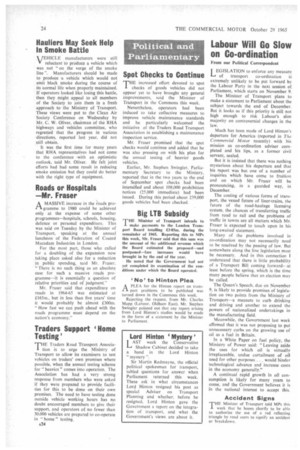Labour Will Go Slow on Co-ordination
Page 26

If you've noticed an error in this article please click here to report it so we can fix it.
From our Political Correspondent I EGISLATION to enforce any measure of transport co-ordination is extremely unlikely to be put forward by the Labour Party in the next session of Parliament, which starts on November 9.
The Minister of Transport plans to make a statement to Parliament about the subject towards the end of December. But it looks as if this priority is still not high enough to risk Labour's slim majority on controversial changes in the law.
Much has been made of Lord Hinton's departure for America (reported in The Commercial Motor recently) with his mission as co-ordination adviser completed and his lips, as a former civil servant, sealed.
But it is insisted that there was nothing mysterious about his departure and that his report was but one of a number of inquiries which have come to fruition and on which Mr. Fraser will be pronouncing, in a guarded way, in December.
The costing of various forms of transport, the vexed future of liner-trains, the future of thc road-haulage licensing system, the chances of transferring traffic from road to rail and the problems of traffic in towns are all matters which Mr. Fraser is expected to touch upon in his long-awaited statement.
Many of the problems involved in co-ordination may not necessarily need to be resolved by the passing of law. But somewhere along the line legislation must be necessary. And in this connection I understand that there is little probability of a Transport Bill coming forward—at least before the spring, which is the time many people believe that an election may be called.
The Queen's Speech, due on November 9, is likely to provide promises of legislation on two points from the Ministry of Transport—a measure to curb drinking and driving and another to extend the powers of nationalized undertakings in the manufacturing field.
Meanwhile, the Government last week affirmed that it was not proposing to put unnecessary curbs on the growing use of oil as a fuel in Britain.
In a White Paper on fuel policy, the Ministry of Power said: "Leaving aside the uses for which oil is virtually irreplaceable, undue curtailment of oil used for other purposes ... would hinder technological advance and increase costs in the economy generally."
A continual rapid growth in oil consumption is likely for many years to come, and the Government believes it is in the national interest to accept this.
Accident Signs THE Minister of Transport told MPs this week that he hones shortly to be able to authorize the use of a red reflecting triangle by road users to signify an accident or breakdown.




















































































































